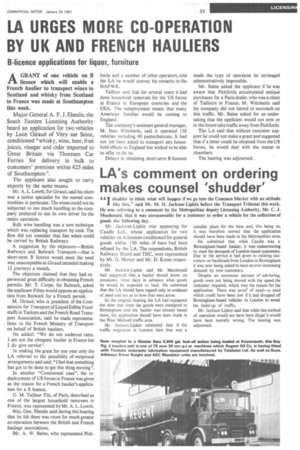LA URGES MORE CO-OPERATION BY UK AND FRENCH HAULIERS
Page 35

If you've noticed an error in this article please click here to report it so we can fix it.
B-licence applications for liquor, furniture
AGRANT of one vehicle on B licence which will enable a French haulier to transport wines to Scotland and whisky from Scotland to France was made at Southampton this week.
Major-General A. F. J. Elmslie, the South Eastern Licensing Authority heard an application for two vehicles by Leon Giraud of Vitry sur Seine, conditioned "whisky, wine, beer, fruit juices, vinegar and cider imported to Great Britain via Thoresen Car Ferries for delivery in bulk to customers' premises within 425 miles of Southampton".
The applicant also sought to carry exports by the same means.
Mr. A. L. Lowth, for Giraud, said his client was a tanker specialist for the named commodities in particular. The wines could not be subjected to too much handling so the company preferred to use its own driver for the entire operation.
Bulk wine handling was a new technique which was replacing transport by cask. The firm did not consider that fine wines could be carried by British Railways.
A suggestion by the objectors—British Railways and Bulwark Transport—that a short-term B licence would meet the need was unacceptable as Giraud intended making 12 journeys a month.
The objectors claimed that they had experienced great difficulty in obtaining French permits. Mr. T. Come, for Bulwark, asked the applicant if they would oppose an application from Bulwark for a French permit.
M. Giraud, who is president of the Commission for Transport of Liquid Edible Foodstuffs in Tankers and the French Road Transport Association, said he made representations to the French Ministry of Transport on behalf of British hauliers.
He added: "We do not undercut rates. I am not the cheapest haulier in France but I do give service".
In making the grant for one year only the LA referred to the Possibility of reciprocal arrangements and said: "I feel that something has got to be done to get this thing moving".
In another "Continental case", the redeployment of US forces in France was given as the reason for a French haulier's application for a B licence.
G. M. Tailleur Fils, of Paris, described as one of the largest household removers in France, was represented by Mr. A. L. Lowth.
Maj.-Gen. Elmslie said during this hearing that he felt there was room for much greater co-operation between the British and French haulage associations.
Mr. A. W. Balne, who represented Pick
fords and a number of other operators, told the LA he would convey his remarks to the NAFWR.
Tailleur said that for several years it had done household removals for the US forces in France to European countries and the USA. The redeployment meant that many American families would be coming to England.
The company's assistant general manager, M. Jean Wittsherin, said it operated 150 vehicles including 40 pantechnicons. It had not yet been asked to transport any household effects to England but wished to be able to offer to do so.
Delays in obtaining short-term B licences made the type of operation he envisaged administratively impossible.
Mr. Balne asked the applicant if he was aware that Pickfords accumulated antique purchases for a Paris dealer, who was a client of Tailleurs in France. M. Wittsherin said his company did not intend to encroach on this traffic. Mr. Balne asked for an undertaking that the applicant would not now or in the future take traffic away from Pickfords.
The LA said that without customer support he could not make a grant and suggested that if a letter could be obtained from the US forces, he would deal with the matter in chambers.
The hearing was adjourned.




























































































































